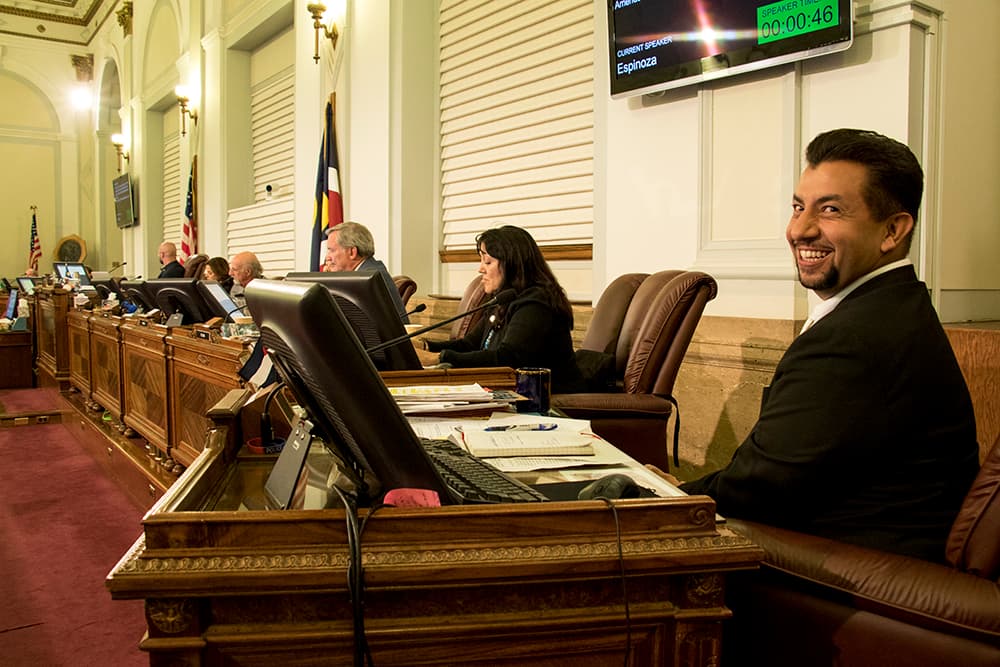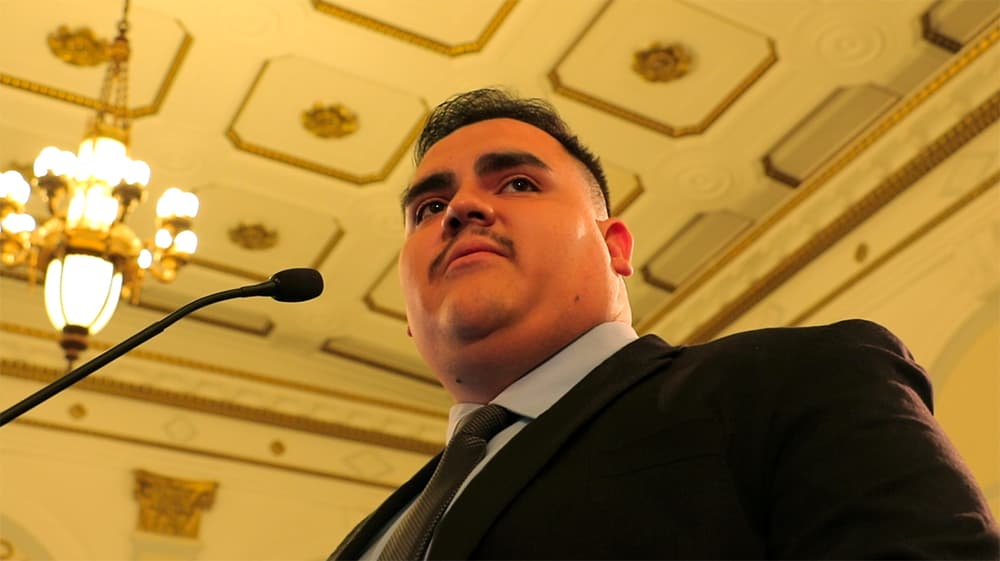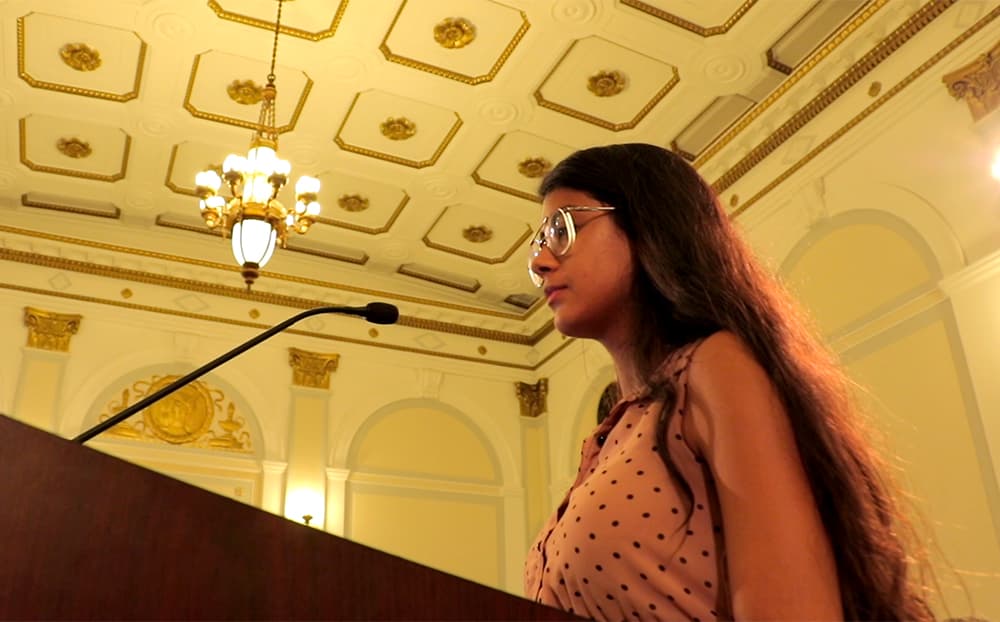
Denver city employees will not ask about immigration status and will not share information about immigration status with the federal government.
Denver sheriff's deputies will not keep immigrants who are otherwise free to go in jail at the request of immigration authorities, but they will continue the practice of giving Immigration and Customs Enforcement a heads up when jail inmates suspected of immigration violations are due to be released.
This was already the general practice of the city of Denver, but now it's the law under a bill adopted unanimously by the Denver City Council. Mayor Michael Hancock is expected to sign the bill -- which represents a compromise with his administration -- later this week.
This bill will make a concrete difference: If a city employee violates these rules now, they'll have broken the law and face the corresponding discipline.
But more than anything, it's a message from Denver to the federal government, which has threatened to withhold funding from so-called sanctuary cities.
"We watched as our new president called us rapists, drug dealers and criminals," said Councilman Paul López, one of the main sponsors of the bill. "Our children cried in fear as our new president threatened to separate their families and build a wall of deportation. ... Our community has stopped calling the police. Nine cases of domestic violence, we know that people have not shown up, not wanted to testify, not wanted to be seen, and that's not right.
"Let folks know, whether it's here or in Washington, D.C., that we are no longer afraid, and we are not going to let anyone, not even a sitting U.S. president, not even a rogue agency, coerce us, force us to violate the constitution and do their dirty work. If you have any business with us whatsoever, we ask you one thing: Show us a warrant. That is what we protect, our constitution."
More than 30 speakers -- all of them in favor of the bill -- told Denver City Council members that immigrant communities are living in fear under this administration.

"I know what it's like to live in Denver and not feel like you have equal protection of your constitutional rights," said Victor Galvan, a member of the Colorado Immigrant Rights Coalition, who described himself as undocumented. " ... This is not about immigration. Though immigrants will be greatly impacted by this ordinance, we want the community to be safe for everyone. If I, as an immigrant, witness a crime, I'll feel like I can pick up the phone and call the police."
Denver police have recorded a decrease in crime reporting from Latinos since the beginning of the year, even as crime reports from other groups have increased.
The Rev. Howard Dotson described working with the families of homicide victims who could not get justice because immigrant witnesses were afraid to come forward.
"We need bridges in our community," he said.

Alexa Bailon said she has lived in fear of the police her entire life due to her family's immigration status, running home to hide if she saw a police car while playing with her friends.
"The fear being pushed into communities by the federal government is more forceful than what I grew up with," she said. "We must protect our immigrants because we are members of the community who love our city just as much as anyone else. ... Denver should not be a place where you hide from cops, but are protected by them instead."
Julie Gonzales, policy director at the Meyer Law Office, described a months-long process of educating city officials about the issues facing immigrants. City officials were initially skeptical that ICE agents were waiting in the hallways of courthouses to arrest people until an attorney took this video.
Nothing in this bill prevents ICE agents from continuing to hang out in courthouses -- Councilwoman At-large Robin Kniech, the other co-sponsor, said city officials have not yet found a legal strategy that would allow them to do that -- but it makes it clear that those agents are not acting with the blessing of the city.
"This policy will draw a clear line in the sand between Denver city employees and ICE," Gonzales said. "Particularly when we find DACA hanging by a thread, this policy is more important than ever."
Kniech praised the "bravery" of people who testified publicly in support of the ordinance.
"It is a brave thing to talk about your immigration status when you are more vulnerable than you probably have ever been," she said.
Jeffrey Lynch, the head of ICE's Denver field office, called the ordinance "irresponsible" and "dangerous."
“By passing this irresponsible ordinance, the City of Denver’s leadership has codified a dangerous policy that deliberately obstructs our country’s lawful immigration system, protects serious criminal alien offenders, and undermines public safety," he said in an emailed statement. "... Our goal is to build cooperative, respectful relationships with our law enforcement partners. While we will continue our efforts to work with Denver’s city government in support of public safety, it is disappointing that they have taken such an extreme step in the wrong direction.”
And on the eve of the vote, State Rep. Dave Williams, a Colorado Springs Republican who tried and failed to pass legislation that would make cities like Denver legally liable when undocumented immigrants committed crimes, called for the Department of Justice to investigate Denver and accused city officials of pandering to extreme leftists.
Councilman Kevin Flynn urged a clear-eyed assessment of what the bill will and won't do.
He described coming across a "deportation sale" in the front yard of a home in his district, in which a woman with cancer was selling everything she owned to move to San Diego to be closer to her husband, who was brought to this country illegally as a child and picked up on a misdemeanor warrant, then deported. That man was deported under President Barack Obama, and the legislation before council would not have protected him.
However, the legislation is designed to make members of immigrant communities feel safer, and that's a worthy goal, he said.
And if the goal is enhanced public safety, he said, it's important that the bill maintain the practice of notifying ICE when inmates who are also wanted on immigration violations are about to be released from jail.
"Timothy Cruz was not better off and was not safer when a man was released from our jail that ICE had asked to be notified of," Flynn said, referring to a man who was murdered at a light rail station in February. One of the suspects was released from the Denver jail two months earlier with ICE getting a half hour notice, while the other was an American citizen.
In his statement, Lynch predicted more tragedies like that case, even though the bill calls for notifications to continue. Hancock insisted on that provision, and immigrant advocates relented. Denver officials and supporters of the bill say that if ICE wants to arrest people in Denver's jails, it should present warrants signed by judges, just like other law enforcement agencies.
"For the secret and open racists who will soon express their opinions on social media and in emails in the coming minutes and hours and days, the reason there will not be an injunction is because our council is acting consistent with the constitution," Councilman Rafael Espinoza said. "The same cannot be said of the occupant of the Oval Office."
Hancock said the bill sends "a clear and resolute message to our community that we stand with the immigrant and refugee communities and are committed to remaining a city that is safe and welcoming for all.
"Local government’s ability to protect and serve all of our people is enhanced when community members feel safe coming forward as either a victim of or a witness to a crime, regardless of their legal status," he said in a statement. "Through this ordinance and the other steps we are taking, Denver is building a trusting relationship with our immigrant and refugee communities that will improve the safety of our city and help everyone feel more secure."
Hancock plans to sign a complimentary executive order that will create a legal defense fund for immigrants facing deportation and provide assistance to their children.
The unanimous vote was 10-0, with Council President Albus Brooks and council members Christopher Herndon and Mary Beth Susman absent.
Here's what the bill would do:
- Denver will not honor immigration detainer requests to hold immigrants who would otherwise be released from jail so that immigration agents can pick them up. Denver will only respond to a judicial warrant — one signed by a judge. This reflects existing policy and the city’s understanding of the Fourth Amendment.
- Denver employees will not ask for or collect information on people’s citizenship or immigration status, except as required by federal or state law. This is already prevailing city policy.
- Denver will not share any information for the purposes of enforcing immigration law. Fingerprints of people booked into the jail will still go to the FBI and the Department of Homeland Security, as required by federal law, and sheriff’s deputies will inform ICE when certain immigrants are due to be released from jail.
- Denver will not use city resources to assist immigration enforcement, including prohibiting ICE agents from entering secure areas of the jail. That last practice is a change from current policies.
- The ordinance applies to all city and county employees, including probation officers and pre-trial services staff in the Denver County Courts.












